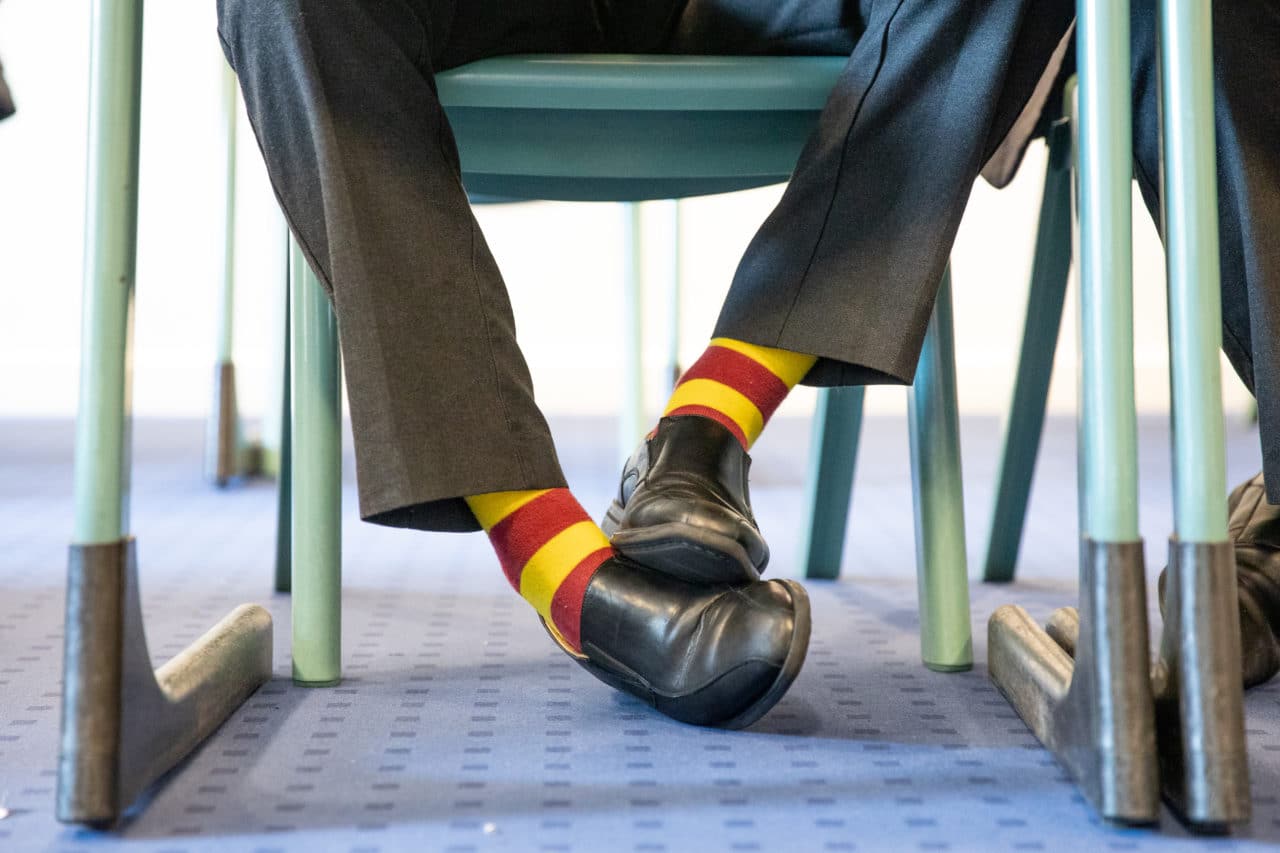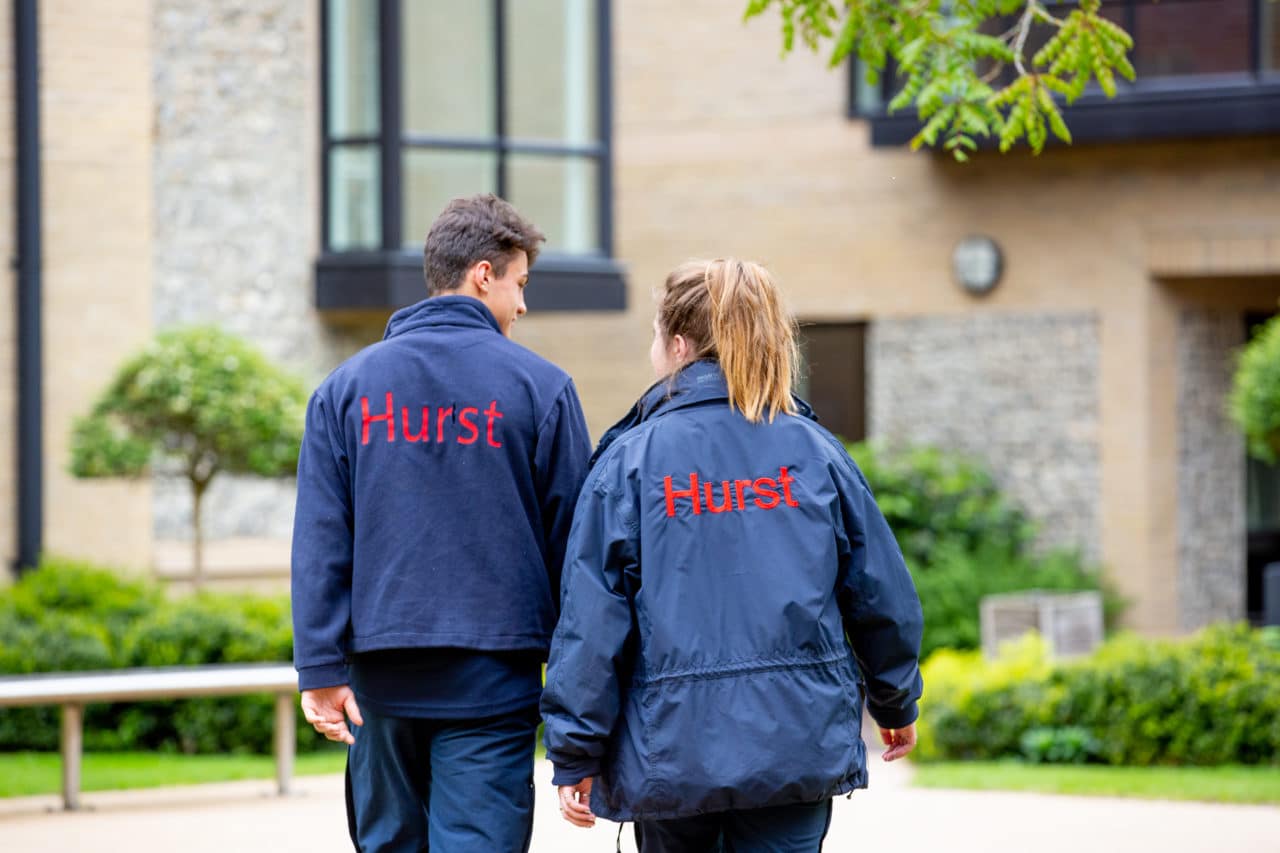For its Autumn/Winter 2019 cover story, Absolutely Education visited Hurst College in West Sussex
Tim Manly doesn’t look much like a revolutionary. In fact, in his checked shirt and book-lined library one might go so far as to say he looks exactly as he should, as the headmaster of an esteemed public school in rural West Sussex.
But make no mistake, Manly is a man who has moved mountains. When he took over the headship of Hurstpierpoint College in 2005 – via Oakham and Sevenoaks – it was a very different place. “It was half the size it is now,” he says. “It was fundamentally a boys’ school, pretty tough, not great academically, and a little bit unreconstructed.”
Fast forward to the present day and Hurst College (as it’s now more commonly monikered) is in rude health. It is now an oversubscribed, fully co-ed all-through school with 840 students in the senior school (1,200 in total). From the beginning of the autumn term 2019, it will have abandoned full boarding entirely, becoming a weekly/flexi-boarding school only. The school shuts on a Saturday. There are no international pupils. In boarding-school land, where many establishments rely on the foreign dollar to balance the books, this is revolutionary.

Which begs the question, why? “We didn’t think we were particularly good at it,” says Manly. The decision was taken a few years ago to move away from international – and therefore full – boarding. “Our rhythm is very much focused on those families buying into the weekly boarding, flexi-boarding lifestyle. Parents and children who want a full-on five-day week, a match on Saturday and the right balance between home and school.”
Manly says much of the school’s growth has come from two areas: “girls, and families who would have typically sent their child full boarding to a Marlborough or a Bradfield but actually live close by and want to have a working week that includes time with their children in a meaningful way.”
Manly says he has witnessed this change in parental attitude in Hurst’s prep school feeders, both the local ones and those in London. Growing numbers of pupils are coming from the south-west London preps – Thomas’s, Newton Prep, Northcote Lodge, Broomwood Hall and “a smattering from Notting Hill Prep”, he says. “These are parents who will be looking at London day schools or looking out [of London] at weekly boarding,” he says. “For them, we are quite an appealing option.”

They are “blessed” by Hurst’s location, he says. Situated “in a field in West Sussex”, as one wag once put it, Hurst is well connected despite being so rural, lying close to the M23/A23 corridor and near to Gatwick. The school’s catchment area includes families within an hour-hour ¼ drive (or those chaperoned in and out of London by train on a Friday evening and Monday morning). Manly says that socially, the school is “very unpretentious” with a wide range of parents, “from tweeded landed types, to City folk, a lot of professionals and a lot of people running their own businesses”.
“We don’t have to have the international market as a sign of success – that’s the real thing that marks us out,” says Caty Jacques, Deputy Head Pastoral.
“It’s a point of difference,” she says. “The pupils go home, there is a fresh feeling every Monday and not that feeling of pupils cooped up on a site.
The school is truly flexi – local students can board for two or three nights during the week. Or board weekly. “The flexibility is really important,” says Jacques. “Parents are very busy and this fits in with logistics of modern-day family life.”
Jacques says the system at Hurst “means we are able to give parents what they want – they want to be in partnership with the school, they don’t want to kiss their kids goodbye at the start of a half term and not see them again for weeks on end.” And as a result, “the communications we have with parents is huge – the tutors will be in good contact with parents, the house parents will be in good contact with parents, so they are very much part of the conversation, part of our school community.”

Day and boarding pupils are split 50/50 throughout the school and the whole school is now co-ed. “Co-ed gives them a far more representative view of life as a whole,” says Jacques. “The world is co-ed. They’ve got to be able to manage that.”
Boarding houses are separate until the Upper Sixth when male and female students live together, another quiet first for Hurst College. “It works so well – it really is that bridging before university,” says Jacques.
“They are there in one place, they can get targeted support through their A-levels and support each other. They have separate male and female corridors but these aren’t locked – I’m not saying they can’t get up to no good,” she laughs.
Jacques gives an example of just how genuinely flexible the flexi-boarding is at Hurst; UVI students can buy ‘overnight packages’ – 20 or 50 nights at time. “They can then board ad hoc whenever they need to.” And, key to the boarding philosophy throughout the whole school, they don’t do “hotbedding” – every Hurst pupil has their own identified space, their own bed for them to use as, and when, they need it. So if your sixth form child has a play rehearsal, late night match practice, even a mountain of prep to do, they can just stay in college. It’s brilliantly simple and convenient.
The other great change at Hurst has been academic. “We’re now seen as a very good academic school but not tipping into what I would term the London premier division,” says Manly. “Your child can come here, go on to Oxbridge and the classic Russell Group universities.”

Manly introduced a Challenge Grades system when he arrived – a joint venture put in place with St Olave’s in Orpington. “We were looking for a tracking and assessment programme which would enable a regular dialogue with pupils focused around what we thought their potential was going to be.”
“The danger in a school that is selective as we are, but not top-end selective, like Sevenoaks was, is that we will get a range – there will be a bandwidth of ability. And it is absolutely critical that everyone in the room – and parents at home – have a real sense of what that child is capable of and whether they are performing to the best of their ability.
“It should be ambitious but realistic. The most corrosive thing is peer-group comparison or benchmarking – this applies to all aspects of life,” says Manly. “We all want to know: am I capable of doing better than this? How can I get there? And please can you let me know that I’ve actually arrived and celebrate it. That has revolutionised the ethos within the College.”
Recent figures prove the plan is working. Hurst College is celebrating the strongest ever set of results at both GCSE and A-level, in what Manly has described as “a great year”. At A-level, 84% of grades awarded were either A*, A or B, with the overwhelming majority of Hurst leavers taking up places at their first-choice universities.
This year’s GCSE cohort have also beaten previous records. A sizeable 83% of all grades were between 7 and 9, which equate to A and A* grades in the pre-reform currency. Remarkably, the most commonly awarded GCSE grade achieved by Hurst pupils is the coveted grade 9, introduced by the government to identify the very best students nationally.

But for Manly, academic grades are just the beginning. “At Hurst we believe that school is not an end in itself. It’s about taking children, however old they may be and developing and growing them, so they are ready to go on aged 18.”
“Grades are critical in giving you a choice of doors to go through but what happens on the other side of the door is down to the individual person and their skills and values they have,” he says. Manly’s abiding belief is that in order to make a success of yourself, you must fully engage with whatever you are doing.
“The real mantra here is you are encouraged to achieve your personal best whether that’s brilliant or not,” he says. “It’s about getting stuck in. Whether you are an A team player or D team player, what matters most is that you give your best and that is what is valued above all else.
“It’s about what you as an individual can achieve. If a child feels that they will be valued for how they throw themselves into stuff, and pick themselves up when things get ropey, they will feel confident about their achievements because they will recognise they’ve given it their best shot and they will value themselves as well.
“If you can do that, then you have a much stronger, more robust individual who can deal with the various knocks and will also be able to deal with the comparisons made between themselves and others, whether that be on Instagram or a grade sheet.”

Manly wants his pupils to leave the school having had a wide range of experiences. Silver DofE is compulsory in Year 10, all boys do dance in Year 9 and drama is compulsory, too. The school does more than 20 productions a year and Manly firmly believes in the power of drama to build character: “You’ve got to be able to communicate and connect”, he says.
He explains that these co-curricular subjects are compulsory because “You’ve got to override that instinct to just stick with your friends or what is cool or what you have done before.” He wants students to try everything “until the stage is reached when they recognise, ‘You know what, this is me.’”
Manly says this growth can only happen in a place where the culture says “just do it” – I’m not looking for outcomes I’m looking at how you develop and grow and approach the life you want to lead.
He is not interested in what he calls “corrosive competition”. “A little bit of competition is great – but I don’t want my pupils thinking ‘You know what, I’m not going to win, I’m not going to be in the A Team, I’m walking away now’ – that’s very bad news,” he says.
Manly adds: “An important footnote to that – if you make the most of what you’ve got, that’s great, but at the same time, I expect you to be kind, be decent to others and be decent to yourself as well.”
It’s worth remembering that this is fundamentally a Christian school. High Anglican in its leanings, it’s part of the Woodard Corporation, a charity that owns and runs 40 Christian schools including Lancing College and Ardingly College. “We are not a particularly religious school in sense of observance,” says Manly. There is only one weekly compulsory service on a Friday – “a moment to pause, prior to the weekend” – but the Christian ethos of charity, a sense of duty and a sense of service is clearly a strong moral seam running through the school.

This extends to the values Manly hopes to instil in his students. “If all I’m doing is perpetuating a wealthy elite, that’s really not good enough, it’s about you being successful and enabling others to be successful as well. You’ve got something you’ve leveraged off here and they haven’t. If you do that, I’m ok; if you don’t, it’s not so good,” he says.
Manly’s plan for the next five years is consolidation, incremental improvement, “more consistently brilliant stuff”. He doesn’t want the school to get bigger – it would be “too Darwinian” – he says. Access is an issue – the local bursary programme is growing with pupils from the BN6 postcode coming in on 110% bursaries from Year 7 upwards; Hurst is also doing lots of work with a couple of local academies and Manly says there are further plans in the pipeline.
But there’s no denying that Hurst College is in a good place. Manly has clearly found a formula that he believes works well for his students. “It’s all about engagement – if they engage, everything else will follow. It must come with a culture that says ‘you don’t have to be brilliant, you’ve just got to get on and do it.’
If you enjoyed this article, why not read ‘How to support bilingual children?’
You may also like...

























